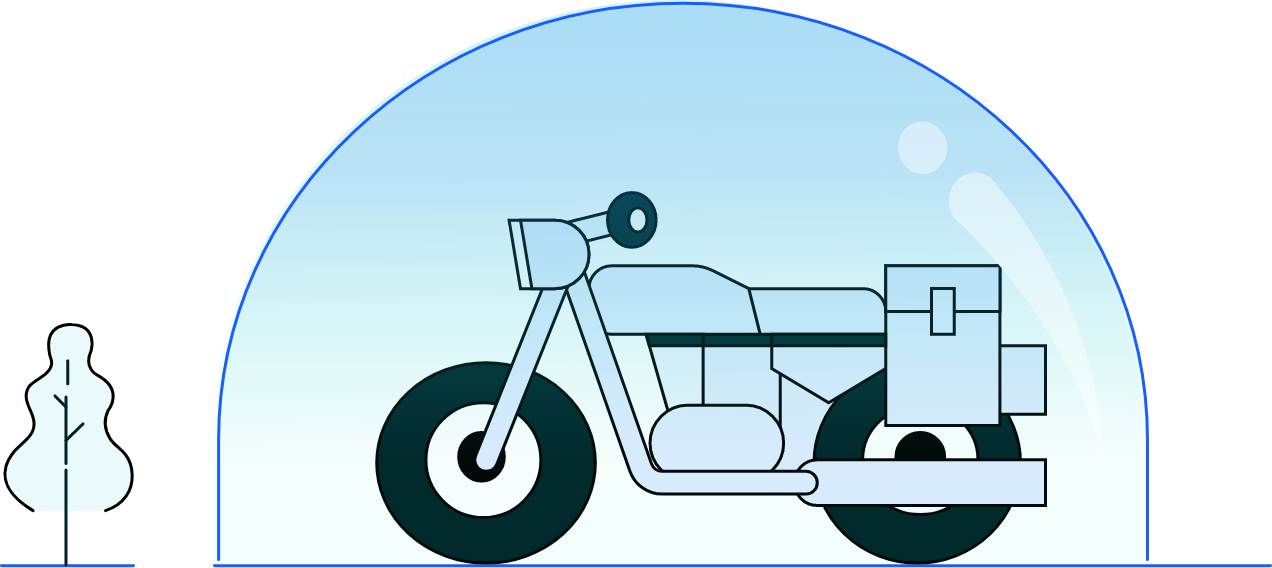ABS vs CBS
Driving a bike safely is more important than just driving it for the sake of convenience. Fortunately, in today’s time, modern bikes come with a range of safety features. As you may be aware, road accidents are pretty commonplace but can be avoided if you know what makes your bike safe.
To help bike owners make their bikes even safer, the Indian Government introduced a mandate stating that all bikes purchased or sold from 01 April 2018 must be equipped with ABS (Anti-lock Braking System) or CBS (Combined Braking System). But what are these safety features, and how do they work? Let us know more and see the difference between ABS vs CBS.
Share this article

List of Content
- What is the ABS or Anti-lock Braking System?
- What is CBS or Combi Brake System?
- How to Choose Between ABS vs CBS in Bikes?
- Do I Need a Bike Insurance Policy?
- Conclusion
What is the ABS or Anti-lock Braking System?
The ABS, or anti-lock braking system, was initially developed for cars but is now also used for bikes. In today’s time, even sports bikes have this feature which comprises a cage-like structure that offers smooth and balanced pressure on the brakes, preventing them from locking up. This happens in non-ABS bikes because the pressure goes from the master cylinder to the brake calliper directly. It can be dangerous since the locked wheels lead to skidding and, consequently, road accidents.
What is CBS or Combi Brake System?
The Combi Brake System, which was first used in the 1970s, was primarily introduced in India in 2009. For new riders, it has proven to be the most beneficial. When the front brake and rear brake are applied simultaneously, this type of braking system has been found to be the most effective since this improves the overall braking performance.
But do note that if your bike has been fitted with the CBS, you need to exercise greater control and need more practice using the bike.
How to Choose Between ABS vs CBS in Bikes?
As you can see, the Anti-lock Braking System (ABS) and the Combination Braking System (CBS) are safety features for your bike. However, it remains to be seen how they both compare with each other and which one can be more effective for your bike.
As mentioned above, the Anti-lock Braking System (ABS) was initially created for cars and only moved to bikes later on. On the other hand, the Combination Braking System (CBS) is more commonly found in two-wheelers.
However, to understand the differences between CBS vs ABS, here are some points of comparison:
- Cost of the safety feature: According to the National Highway Traffic Safety Administration (NHTSA), the ABS has been found to be quite effective in preventing bike accidents. This is what makes ABS a much more expensive installation for your bike. On the other hand, CBS can be a more reasonable option if you are looking for a less expensive alternative.
- Performance on the road: If you are using your bike on very slippery roads, then it is advisable to opt for ABS since it works better for improving the bike’s stopping time. However, Combination Braking System is a better option for rough and uneven areas such as hilly terrains or slopes where you need the bike to be more stable.
- Bike owner’s preference: We already know that ABS and CBS can be used in bikes; however, the choice of one over the other can also be determined by the bike owner’s or the rider’s personal preference. If you feel that you are able to apply both brakes at the same time, go for the CBS. However, if your daily commute requires you to apply your bike brakes aggressively from time to time, the Anti-lock Braking System can be a better pick.
- Of all these factors, the pricing of the ABS may deter a lot of bike owners from choosing it as their preferred bike safety feature; but it is more important to actually understand which feature is better suited for your needs. There is no doubt that the braking performances of both systems are equally good and it can get difficult to choose one.
- But apart from picking either one of the two braking systems for your bike, also make it a point to get bike insurance for your two-wheeler.
- Equipping your bike with ABS and CBS can certainly help you with a safer ride, but bike insurance goes all the way to ensure that a range of different risks that can cause losses to your two-wheeler are covered under one comprehensive policy.
Do I Need a Bike Insurance Policy?
Irrespective of which braking system you opt for, getting insurance for your bike is a must. And this is not just because third-party bike insurance coverage is a legal requirement; bike insurance also keeps your bike safe from a range of risks, damages and losses!
Even if you choose to start off with a basic third-party cover initially that only covers damages to third-party persons, properties and vehicles, consider upgrading to a comprehensive policy that can be customised easily as per your requirements.
Many bike owners opt for a long-term two wheeler insurance plan. By doing so, they can avoid the hassle of paying annual premiums since long-term bike insurance plans offer coverage for 2 or more years with just a single premium payment.
Buying bike insurance online gives you the liberty to choose the type of two-wheeler insurance you need. For one, it allows you to choose the tenure of your long-term bike insurance plan, select a suitable Insured Declared Value (IDV) for your bike, calculate your premiums and also customise the policy as per your needs. With a Tata AIG comprehensive bike insurance plan, you can choose from 8 unique add-ons that enhance your bike’s protection.
Conclusion
In summary, when comparing ABS vs CBS, it is always wise to consider your bike’s cubic capacity. This will help you determine which safety feature is best suited for your two-wheeler. Moreover, if you feel that you can pay more money and opt for the ABS, then you can select this option. There won’t be too much of a difference in the performance of both the braking systems.
And remember to also protect your bike with adequate bike insurance coverage soon after you purchase your bike. This way, you can avoid traffic fines and ride your bike without any worries!
Share this article
Latest from our blogs

5 Tips To Keep Your Two Wheeler Looking New
Make sure to wash it often. This keeps dirt and other unwant...
Read More
What Does It Take to Be a Good Biker?
You must have wondered what it takes to become a better ride...
Read More
5 Things You Did Not Know About Two Wheeler Insurance
In a time of heavy traffic and accidents, two wheeler insura...
Read More